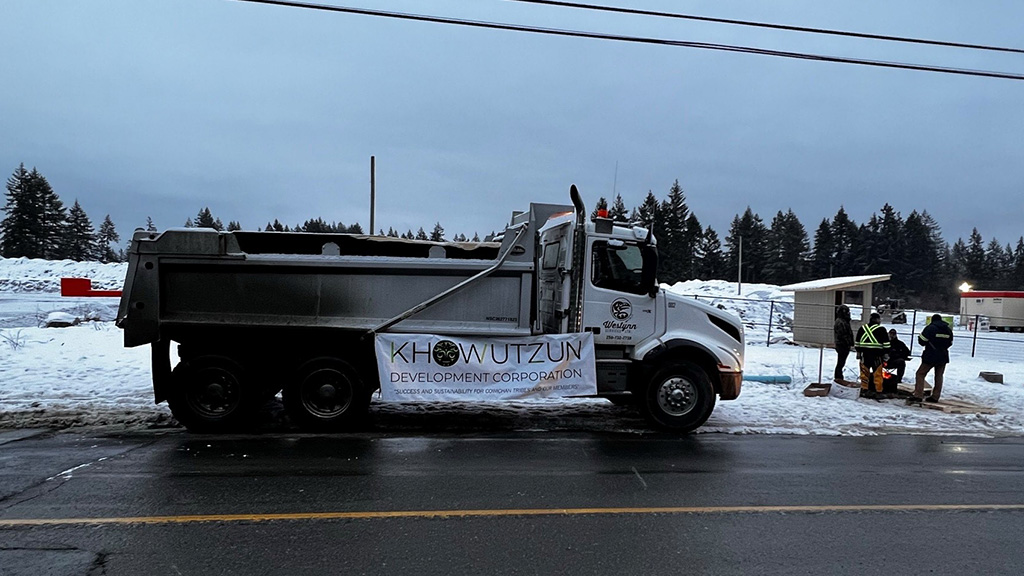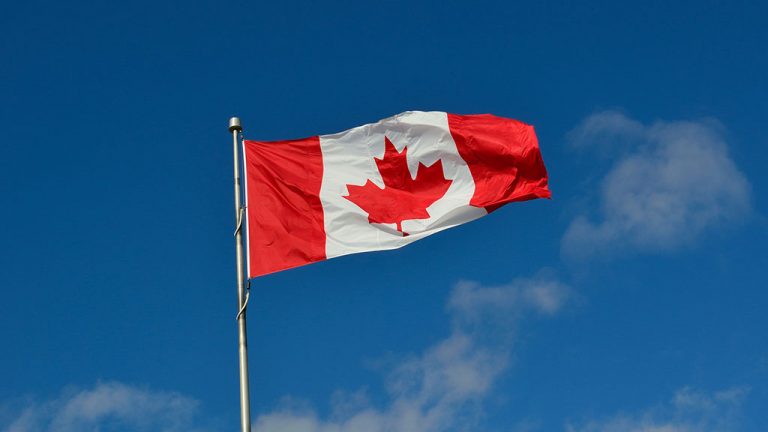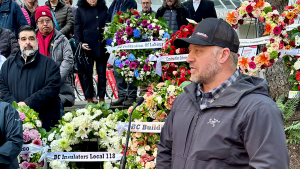Senior contractor with the Khowutzun Development Corporation (KDC) Jon Coleman said Community Benefit Agreements (CBAs) in British Columbia overstep the ability for Indigenous communities to consult on projects in their own territories.
Coleman, a Cowichan Tribes member and owner of Jon-Co Contracting, was temporarily locked out of working on the Cowichan District Hospital Replacement Project last fall due to its status as a CBA project.
“This just emotionally sunk me. I had to snap myself out of a depression. I had to sell my equipment because I couldn’t work. I have eight kids at home to feed,” Coleman told the Journal of Commerce (JOC) in an interview recounting the events of last fall.
He first started mobilizing in May 2022.
“They explained that the hospital was a go and I got kind of excited about it. I operate a little mom and pop shop here in Duncan and got into a 30-tonne rock truck and acquired a brand new 15-tonne roller which added benefit because I have a 345 Hitachi,” Coleman said.
He was hoping the work from the hospital would ramp up business for him and other people affiliated with Cowichan Tribes, on whose territory the project is taking place.
As senior contractor for the KDC, Coleman helps organize how affiliated businesses work on projects. He said several members of KDC were involved in clearing the land including himself and the KDC’s Forestry division.
He also spoke with members of Hall Constructors Corporations who told him their desire was to put Cowichan Tribes businesses at the front of the line for working on that project. But the CBA overruled any MOUs or agreements made by companies affiliated with the development, he claimed.
Coleman said when BC Infrastructure Benefits arrived on scene last November, they’re Indigenous liaison staff told him and other Cowichan workers they needed to join an approved union or leave the project.
“I said…’that is not happening,’” he said.
Under section 8.101 of the CBA legislation passed in 2018, all employees under a CBA need to secure membership in an affiliated union.
Among many reasons, Coleman cited the fact he would lose control over how exactly he operated his business as an essential reason for refusing to join an affiliated union.
Coleman and other Cowichan Tribes contractors set up their vehicles and blockaded the project in December 2022, protesting the development was in Cowichan Tribes territory and had effectively jumped over consultation with Cowichan Tribes.
“It just shows the blatant disrespect for First Nations companies, territories, boundaries, and that it wasn’t forward thinking,” he stated.
But he said he did not want to prevent other honest construction workers from being able to feed their families and decided to “take the fight straight to the legislature.”
In February 2023, Health Minister Adrian Dix said Cowichan Tribes contractors would be exempt from certain restrictions in the CBA and allowed to work on the project.
According to the Government of British Columbia, some Cowichan contractors have returned to work. A Government spokesperson told the JOC Coleman had worked on the site since then as well, but Coleman denied this claim and said the only KDC people working on the project since February have been truck drivers.
He said he was onsite once just to see what was happening but has not worked since being barred last November.
And he still feels the situation is unfair for Cowichan Tribes and other Indigenous bands across the province who are being subject to CBA restrictions to work on projects in their own territories.
Coleman pointed out in 2021, the Government of British Columbia removed section 9.505 of the CBA which allowed Indigenous contractors to work on CBA projects through a permit that effectively removed the restrictions placed on others, such as the need to join an affiliated union.
Upon realizing the clause had been “arbitrarily removed,” Coleman said he was upset.
“This government is stepping over us in regards to this article 9.505.”
Coleman wants article 9.505 reinstated so he and other Indigenous contractors retain some independence in how they work on projects within Indigenous territories, saying it is the “bare minimum” the province can do.
Coleman is now considering raising the idea to Cowichan Chief Lydia Hwitsum.
“I explained it like this to Cowichan councillors: ‘Would the American government be able to build a car plant in Canada without negotiating with the Canadian government?’ Of course, they said, ‘No.”
During the months that he could not work, Coleman said he lost around $600,000 in income as a result of missed wages, and the equipment he had previously purchased and was then forced to sell at a loss. He said he would like to see his company and other Indigenous companies who suffered as a result of the CBA compensated.
“Let’s scrap the CBA and watch the other bands get behind us because we are the largest in the province. A lot of people are watching this. That would be my wish list.”
The Government of B.C. did not respond to further questions before deadline.











I believe this is a blatant disregard for the local contractor and work force including the proven high quality performance and work ethics demonstrated by the first nation contractors approved by the Cowichan Tribes regulatory body and they’re quality control over those approved contractors that can and have met they’re stringent qualifications.
I have personally witnessed they’re dedication, work ethics and performance on the Cowichan school job. Jon Colman has and continues to be a stand up representative for not only the tribal values of the Cowichan Tribes but equally for his Cowichan / Duncan community rites and values.
Thank you Jon, you’re sacrifices don’t go un-notice my friend.
Greg…